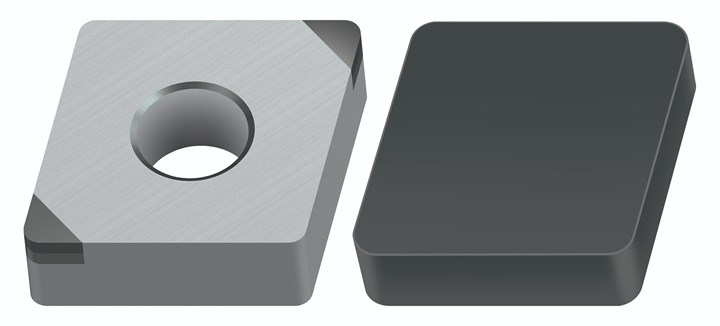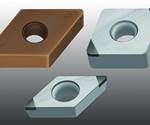New CBN Grades for Cast Iron, Sintered Metals and Hard Machining
Walter's new CBN grades, WBK20 and WBK30, represent both tipped and full configuration for tough machining applications.

Photo Credit: Walter
Walter (Waukesha, Wisconsin) introduces WBK20 and WBK30, new CBN grades that bring higher levels of productivity and reliability to cast iron and hardened steel machining. Both new grades have edge-preparation designs further optimized for their target applications.
With its tipped configuration, WBK20 is said to be exceptionally wear resistant and well suited for cast iron or powered metal workpiece finishing. Because of the higher CBN content, it is also well suited for roughing in hard turning applications.
With its full CBN configuration and high CBN content, WBK30 is ideal for heavy depth of cuts, roughing in cast irons, powder metals and exceptionally hard and tough applications, such as interrupted cuts, in hard turning.
According to Walter, both grades complement its previously released WBH10C coated CBN and WBH10 and WBH20 CBN grade ideal for high temperature stability in hard metal turning. These inserts also have the option of chip breaker (TM-M2) for trouble shooting and wiper (MW2) for exceptional surface finish or higher feed and productivity. Various standard ISO turning insert shapes with these new grades, such as C, D, S and T, are available in both positive and negative clearance geometries. Select grades WBS10 and WBH20 are also available as grooving inserts for aerospace alloys and hard steels respectively.
Related Content
-
The Secrets to Hard Milling Success
The Secrets to Hard Milling Success
-
It Starts With the Part: A Plastic Part Checklist Ensures Good Mold Design
All successful mold build projects start with examining the part to be molded to ensure it is moldable and will meet the customers' production objectives.
-
Machining Center Spindles: What You Need to Know
Why and how to research spindle technology before purchasing a machining center.












